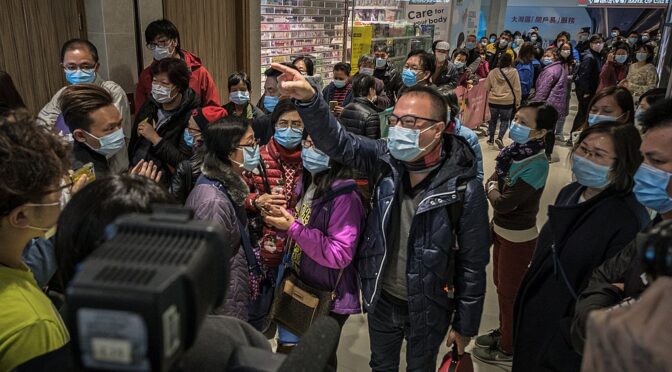Everyone is scrambling for face masks to protect themselves and it makes perfect sense. On one hand we want to protect ourselves and our loved ones and on the other, we don’t want to spread the illness either. At this point, if you are going to the store or other area with people, you really should be wearing a mask. Particles will float in the air and that is bad news for everyone.
The recent CDC guidance to wear face masks seems to be mainly aimed at capturing droplets from the wearer so as to not infect others. It’s not really aimed at protecting the wearer from inhaling. I would recommend you do some reading about what amazing people are figuring out in terms of making your own personal protective face masks using shop towels and other materials. In general, if you can see light readily through it, such as a basic T-shirt or bandanna, you really aren’t stopping anything. I’d like to help improve your odds and want to share some resources with you.
- Just so you have it, here is the CDC guidance – do look at it for design ideas though
- Definitely read this about shop towels. “Using blue shop towels in homemade face masks can filter particles 2x to 3x better than cotton, 3 clothing designers discover after testing dozens of fabrics”
- The following are for mask design ideas:
- A study found that denim, 80-120 thread count bed sheets, paper towel, canvas and shop towels are the top 5 materials for face masks combining both filtering and breathability.
- There is a new material called “Filti” that can hit N95 filtration that you can buy. Click here to learn more.
Buy the shop towels at stores such as home improvement, hardware, automotive and industrial supply stores. Blue shop towels are *not* regular kitchen towels. If you try to buy them online they will likely be insanely expensive. You will probably pay $3-4 from a store for a roll with 50 sheets. They often come in single rolls, doubles, six packs, 12 packs and boxes. Don’t go nuts and hoard them please.
The following are shop towelas and 1/16″ bungee/elastic cord for making masks at Amazon
The following is a great how-to video. By the way, the accordion folds help with fit and increase the surface area which will make breathing easier. The larger the surface area then the easier air flows.
By the way, there are tons and tons of designs as media and bloggers share advice. Google and read by all means – educate yourself. Always ask – does this make sense? Also remember that you need to both be able to inhale as well as exhale.
Quick test to see if your mask has any chance of helping you – Dr. Gady Abramson
Cleaning Face Masks For Re-Use
With face masks, assume they are contaminated when you remove them with your hands. Immediately wash your hands and do not rub your eyes, touch other surfaces, etc.
Now, you can disinfect these things and other PPE using an oven. Heat them to 70C/158F for 30 minutes. Be sure not to touch other surfaces around your oven. Clean all surfaces just to be safe.
- https://federallabs.org/news/covid-19-evidence-service-highlights-niosh-face-mask-findings
- https://www.livescience.com/sanitizing-medical-masks-for-reuse-coronavirus.html
- This is more technical in nature wherein researchers are looking at methods for decontamination: https://www.n95decon.org/
Making Your Own Hand Sanitizer
We now have a blog post with lots of information and videos for you – click here.
Disinfecting Surfaces
Lastly, are you running out of disinfectant to clean surfaces? Use bleach and water.
- The CDC has “Cleaning and Sanitizing With Bleach After An Emergency”
- The New Hampshire state government has a nice short PDF on cleaning with bleach also.
- 1/4 cup bleach per gallon of water for tables,bathrooms and toys
- 1/3 cup of bleach per gallon of water in case of accidents or illness.
I hope this helps you out – we’re all in this together.
If you find this post useful, please share the link on Facebook, with your friends, etc. Your support is much appreciated and if you have any feedback, please email me at in**@*********ps.com. Please note that for links to other websites, we are only paid if there is an affiliate program such as Avantlink, Impact, Amazon and eBay and only if you purchase something. If you’d like to directly contribute towards our continued reporting, please visit our funding page.
Photo of people wearing surgical masks in Hong Kong is from Wikipedia. Posted By Studio Incendo – DSCF2199, CC BY 2.0
